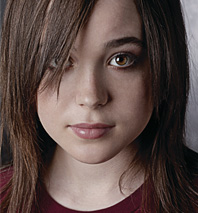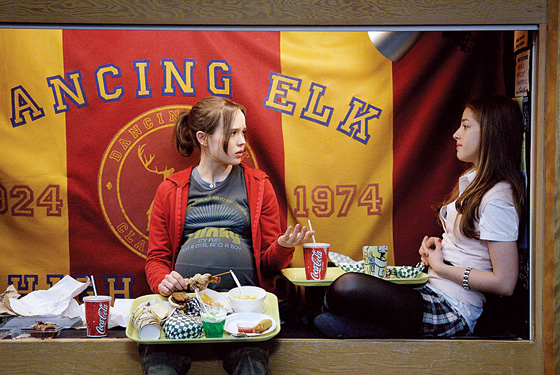
Ellen Page is more than happy to explain why your favorite teen film sucks: “What they do to Ally Sheedy at the end of The Breakfast Club,” she groans, recalling how Sheedy’s androgynous loner gets a pink Barbie makeover so she can kiss the jock. “How could that have been allowed to happen? No, really. I mean it. I know it’s iconic … but you’ve got to be kidding me!”
Think about the poor kids who’ve watched this stuff, she continues, leaning into her argument. Films like that make tomboys like her “start judging ourselves, just because, you know, you’d rather climb trees than give blow jobs.”
Just 20, Page was born two years after The Breakfast Club, and she has a very different movie legacy in mind for herself. Prone to making self-deprecating remarks out the side of her mouth (“I’m like Sarah Silverman on speed—maybe not as racist”), she’s got a lot in common with the girl she plays in Juno, opening next week. And the film backs up her complaints: It’s the wiseass answer to every teen flick that has forced an oddball girl to take off those glasses, don a tiara, or go on some montage-happy shopping spree before the big date. Better yet, it’s a sharp-tongued retort to the dick jokes of Superbad and Knocked Up. Directed by Thank You for Smoking’s Jason Reitman, Juno is also a fresh spin on the booming genre of weirdo-hero movies—and one of very few to star a girl.
Guys have had weirdo heroes for years, from the mumbling, itchy James Dean to the recent dweeb explosion of Thumbsucker, Igby Goes Down, Tadpole, Rocket Science, and Napoleon Dynamite (not to mention the Judd Apatovian man-child boom). TV has a comparatively proud history of anti-heroines, but, despite rare exceptions like Heathers, girls are still basically stuck with films about boy-crazy mall rats, peppy legal blondes, astoundingly naïve editorial assistants, and only slightly updated princesses.
“I was obsessive about getting this role, because I don’t think we’ve ever had a character like Juno,” says Page, who, in a roundabout way, is asserting that teen films have never had anyone quite like herself. “She is abrupt and unapologetic, extremely independent, and listens to seventies punk—and the film doesn’t dwell on her uniqueness, you know? There’s no, ‘Oh, look at this crazy outcast!’ She’s not interesting in relation to a stereotype—she wears flannel shirts and sweater vests, and it’s just who she is.”
Specifically, Juno MacGuff is a hyper-self-aware 16-year-old who gets knocked up by her goofy beau, played by Michael Cera. And unlike Knocked Up, this pregnancy comedy doesn’t run from the word that the guys in that film say “rhymes with shma-shmortion.” Juno immediately rings up the Women Now health clinic—“because, you know, they help women now”—and says, “I’m just calling to procure a hasty abortion.” She changes her mind, but not just because a born-again friend pickets her, nor because the clinic’s receptionist offers her a flavored condom and the recommendation that it makes “my boyfriend’s junk smell like pie.” Juno’s motives, about most things, are complex, buried in wisecracks and not explicitly political: She thinks over her options, then decides to carry her baby to term and give it to a more capable couple—so long as they’re not “child molesters or stage parents.” After she finds two infant-seeking yuppies (Jason Bateman and Jennifer Garner) in the Penny Saver, she nicknames herself “the Cautionary Whale.”
Page grew up in Nova Scotia, where she still lives, and cut her teeth working as a child actor in Canadian television, always playing the “wise-for-her-years kind of girl,” even then. She achieved some fame on the show Trailer Park Boys, but she doesn’t make much of it: “Mostly, I was in movies-of-the-week with ghosts and animals and things like that.” She says that she nearly made the biggest mistake of her career at age 13, when she got a major part on an American sitcom. “I was super-excited, but my parents said no. It’s a good thing. I would have had to move to L.A., and I can’t even imagine what I would be like now. I shudder to think.” It’s hard to envision Page as a Lohan-like burnout, but she says she has “a lot of compassion” for the tabloid stars, “because I feel like a lot of them were extremely hypersexualized at a very young age. Having their whole lives whored out must be a hard thing to deal with.”
Instead of going to California, Page worked her way through TV movies to independent film, where she’s gone against the grain of her baby face in a series of tough, even brutal roles. In Hard Candy, she plays a vicious teen girl who gets revenge on a child pornographer by seducing him and then torturing him on-camera. In Mouth to Mouth, she’s a runaway caught up in a seductive but corrupt European commune. In the forthcoming An American Crime—based on the horrifying real-life story of Gertrude Baniszewski—she plays a teenage girl who gets locked in the basement and tortured to death by her quasi foster mother. Despite all that, it’s her brief turn as the disappearing hero Kitty Pryde in the last X-Men that gets her the most recognition on the street. “I’m not some dark, edgy individual, really,” she says. “I just think it’s harder to find a good script that’s genuine and sincere.”

Roger Ebert, among others, is predicting she’ll nab an Oscar nomination for Juno—regardless, Page says, she still has no plans to leave Nova Scotia for Hollywood. “I just got my own place. I was having dinner with some friends of mine in Brooklyn last night—they were like, ‘Wow, you have your own life now!’ Obviously, I’m 20, but I was like, ‘Yeah, I do.’”
The movie could very well make her a star, not just the next Molly Ringwald but the next Johnny Depp: a transgressive teen idol whose weirdo-hero crossover appeal might evolve into real staying power. But perhaps it really is best that she avoid L.A. Because right now she’s watching herself play one kind of girl yet still being pushed toward another. “It’s just freaky. Like, are we really still stuck there?” she asks, noting that a few photo shoots have already set off warning bells. “Every shoot, I don’t want to be thrown some lacy pink shirt—sometimes I would prefer to not wear a shirt at all. At least I’d be owning that moment.
“I mean, Annie Lennox used to be able to dress like a man and sell albums,” says Page, in her flannel shirt and Converse sneakers. “I don’t think a big star could do that right now.”